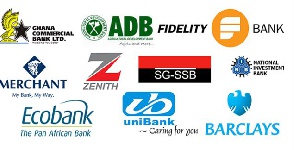 Bank of Baroda and Standard Chartered Bank continued to offer the least competitive lending rates
Bank of Baroda and Standard Chartered Bank continued to offer the least competitive lending rates
Bank of Baroda and Standard Chartered Bank continued to offer the least competitive lending rates to customers for the 6th time running this year, according to the latest Average Interest (AI) and Annual Percentage Rates (APR) released by the Bank of Ghana which captured June 30, 2017 figures.
The two banks offered the cheapest loan rates respectively for enterprises. They offered rates of 22.0 and 25.0 percent respectively to borrowers in agric, commerce, manufacturing and construction sectors.
For households, Bank of Baroda and Stanbic offered the least lending rates of 22.0 and 26.3 percent respectively to consumers.
Capital and NIB offered the most expensive loan rates for enterprises in commerce and manufacturing respectively. They charged between 37.2and 39.4 percent as well as 37.2 and 38.1 percent respectively.
First Atlantic Bank also offered very high lending rates, above 37 percent. First National Bank did make its rates available.
For consumer loans, First Atlantic Bank the most expensive rate of 41.2 percent followed by HFC and Omni Bank which offered between 39.5 and 37.9 percent respectively.
With regard to liabilities or deposits, Omni and Bank of Baroda offered the highest attractive rates of 17.3 and 15.4 percent respectively to consumers. In contrast, Energy Bank and Stanchart paid the least deposit rates of 5.7 and 5.9 percent respectively to clients.
According to the Bank of Ghana, the industry average base rate as at June 30, 2017 was 26.3, according to the data. This represents a marginal drop of 0.3 per cent, compared to 26.6 per cent at the end of May.
The average deposit rate as at June 30 was 10.9 per cent, a marginal decrease of 0.3 percent, compared to 11.2 percent at the end of May 31. At the start of the year (end-January), the average deposit rate was 11.9 per cent, giving a year- to- date decrease of 1 per cent.
The APR is the true interest rate banks and non-bank financial institutions charge the public on loans and advances. It reflects the true cost of borrowing and includes charges and commissions levied by banks. Average interest paid on deposits is the average interest paid by banks on deposits over the period.
The publication of these rates is to promote transparency in the pricing and provision of banking services. In all, the list covers 32 banks.